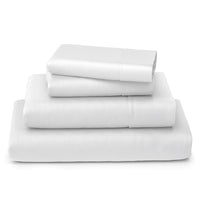
Sleepy vs Fatigue: What’s the difference?
Sleepiness and fatigue may seem like interchangeable terms, but there’s actually a difference between the two. Though fatigue is similar to being sleepy in that it involves an extreme lack of energy, the actual causes, and experiences of the two conditions aren’t the same.
What’s the difference, you ask? Keep reading to find out (plus a few extra facts).
Sleepy - adjective - /ˈslēpē/

- Needing or ready for sleep.
- Showing the effects of sleep.
Easy math: poor sleep equals low energy. It seems like a no-brainer, but it’s more complex than that. Feeling sleepy can be caused by things like [1-10]:
- Troubled sleep. Such as waking up frequently during the night.
- Your morning cup of coffee. The effects of caffeine wearing off, usually in the middle of the day, generally leads to a build-up of adenosine and that dreaded mid-day slump.
- Difficulty falling asleep. If it takes over 20 or 30 minutes to fall asleep, there might be an underlying issue—always consult your doctor if you have concerns.
- Eating a big meal for lunch. Big meals can sometimes cause your insulin levels to spike.
- Regulators are off. Fluctuations in cortisol, insulin, leptin, vasopressin, and other key regulators can play a role in feeling sleepy.
- Eating foods high in certain vitamins and minerals. Foods like bananas can trigger the production of the ‘sleepy’ hormone melatonin.
Feeling sleepy is normal and sleep is an irrepressible need. Why is it so important? [1,4,6,7,8]
- Boosts healthy energy levels.
- Helps with metabolism.
- Maintains sugar regulation.
- Assists with appetite control.
- Aids digestion.
- Lack of sleep can eventually contribute to chronic fatigue and even disease.
- Helps with development and growth.
- Maintains normal mental health and positive moods.
- Allows you to feel recharged, refreshed, and alert when you wake up.
- Contributes to your overall health and well-being.
- Your body needs sleep to function properly on a day-to-day basis.
Fatigue - verb - /fəˈtēɡ/

- Cause (someone) to feel tired or exhausted.
- Drained of strength and energy.
Sleep experts have often found that fatigue has underlying causes, such as hormonal imbalances, chronic stress, nutritional deficiencies, or even hidden infections. Individuals who suffer from insomnia also generally experience fatigue. Other factors like mental, physical, or emotional stressors can leave fatigued people waking up with no energy that doesn’t seem to improve throughout the day and isn’t even relieved with sleep. [1-10]
Unlike simply feeling sleepy, fatigue is much more persistent and lingering, though being sleepy may be a symptom of fatigue. Fatigue can leave people feeling lethargic, ‘fuzzy-headed,’ or stuck in a perpetual state of brain fog.
Ever tried taking a nap when you’re feeling extremely tired, but just can’t seem to fall asleep? You may be suffering from fatigue. You’re not necessarily sleepy, but you’re very tired and drained.
What Can I Do To Combat Sleepiness?

It is completely normal to feel your energy take a nose-dive around the 3:00 PM mark. In adults, our wake/sleep cycle (regulated by our circadian rhythms) can dip in the afternoon and rebound in the evening. [1-10] That’s why making sure your sleep schedule, patterns, quality, and quantity are all in check!
To ward off the afternoon nose dives or the occasional mid-day sleepies, check out these tips and tricks for the best night’s sleep [11,12,13,14]:
- Don’t use any form of technology for at least 30 minutes before bed.
- Make sure you are comfy and cozy when you go to bed. Who doesn’t hate being overheated and constantly tossing and turning? Our Bamboo Viscose Loungewear is just the thing—made with the highest-quality bamboo viscose blend for a breathable, moisture-wicked, and cooling night’s rest.
- Make a consistent sleep schedule for yourself. As an adult, you’ll want at least 7 to 9 hours of sleep each night. Sleep experts say that 9:00 to 10:00 PM is prime snooze time.
- Come up with a relaxing pre-bedtime routine that will calm your nervous system, like reading a book, taking a bath, or meditating before falling asleep.
- Create a relaxing oasis with our Cosy Lavender Linen Spray, inspired by aromatherapy and formulated without aerosols, dyes, propellants, and synthetic fragrances, making it perfectly safe for those with sensitive skin and noses.
- Our Luxury Weighted Blanket is another great way to calm your nervous system before and during rest. Our design includes unique deep-touch pressure stimulation technology created by thousands of tiny glass beads to reduce feelings of anxiety while also promoting tranquility.
- Switch your old sheets for bamboo viscose blended sheets. Heavy, stuffy, and scratchy sheets could be hindering your sleep. It’s time to invest in our Cosy Luxury Sheets. You’ll sleep blissfully throughout the night because our unique fabric is one of the most breathable and lightweight fabrics on the market, staying cooler than heavy cotton bedding with thermal-regulating properties that balance your body’s temperature as you sleep. They are also blissfully soft!
What Can I Do To Combat Fatigue?

Unlike sleepiness, fighting and avoiding fatigue is not a one-size-fits-all solution.
Here’s the deal: whether it’s fatigue or excessive daytime sleepiness you’re dealing with, you should be consulting your healthcare provider for the proper guidance. These conditions can be secondary symptoms of an underlying condition, which is why it’s so important to discover the primary cause. [2,3,4,7,8,9]
If you’re suffering from daily fatigue, you might experience some of the following [2]:
- Inability to find rest in sedentary situations.
- Struggling to get through normal daily activities.
- Feeling weary and/or weak.
- Lacking motivation.
- Sensitivity to colder temperatures.
- Experience unexplained weight loss.
- Struggling with memory and productivity.
- Lack of interest in social activities.
- Decrease in mood and possible depression.
If you’ve tried to address common lifestyle causes for fatigue (things like lack of rest, poor eating habits, lack of physical activity or too much physical exertion, obesity, grief, boredom, and stress) without success, and your fatigue has continued for two weeks or more, you need to seek the help of a professional [2].
What are some things that help you fall asleep each night? Let us know in the comments below. The Cosy community would love to hear from you!
Searching for more ways to sleep better at night? Click here to find a range of different products to make your nights comfier and cozier. Maximize your sleep oasis with our Luxury Bedding today!
We've gone ahead & enclosed a 10% off coupon below for you to use if you'd like to take the plunge and try out our sheets for yourself! To shop our collection & get 10% OFF Use the code 'BLOG10' at checkout.
Resources:
- Medic, G., Wille, M., & Hemels, M. E. (2017). Short- and long-term health consequences of sleep disruption. Nature and science of sleep, 9, 151–161. https://doi.org/10.2147/NSS.S134864
- O'Connell, K. (2020, March 29). Fatigue: Causes, diagnosis, treatment & more. Healthline. Retrieved from https://www.healthline.com/health/fatigue
- Reed, D. L., & Sacco, W. P. (2016). Measuring Sleep Efficiency: What Should the Denominator Be?. Journal of clinical sleep medicine : JCSM : official publication of the American Academy of Sleep Medicine, 12(2), 263–266. https://doi.org/10.5664/jcsm.5498
- Harvey, A. G., Stinson, K., Whitaker, K. L., Moskovitz, D., & Virk, H. (2008). The subjective meaning of sleep quality: a comparison of individuals with and without insomnia. Sleep, 31(3), 383–393. https://doi.org/10.1093/sleep/31.3.383
- St-Onge, M. P., Roberts, A. L., Chen, J., Kelleman, M., O'Keeffe, M., RoyChoudhury, A., & Jones, P. J. (2011). Short sleep duration increases energy intakes but does not change energy expenditure in normal-weight individuals. The American journal of clinical nutrition, 94(2), 410–416. https://doi.org/10.3945/ajcn.111.013904
- Rezaei, M., Khormali, M., Akbarpour, S., Sadeghniiat-Hagighi, K., & Shamsipour, M. (2018). Sleep quality and its association with psychological distress and sleep hygiene: a cross-sectional study among pre-clinical medical students. Sleep science (Sao Paulo, Brazil), 11(4), 274–280. https://doi.org/10.5935/1984-0063.20180043
- Isaac, F., & Greenwood, K. M. (2011). The relationship between insomnia and depressive symptoms: genuine or artifact?. Neuropsychiatric disease and treatment, 7, 57–63. https://doi.org/10.2147/NDT.S16267
- Parish J. M. (2009). Sleep-related problems in common medical conditions. Chest, 135(2), 563–572. https://doi.org/10.1378/chest.08-0934
- Chotinaiwattarakul, W., O'Brien, L. M., Fan, L., & Chervin, R. D. (2009). Fatigue, tiredness, and lack of energy improve with treatment for OSA. Journal of clinical sleep medicine : JCSM : official publication of the American Academy of Sleep Medicine, 5(3), 222–227.
- Institute of Medicine (US) Committee on Military Nutrition Research. Caffeine for the Sustainment of Mental Task Performance: Formulations for Military Operations. Washington (DC): National Academies Press (US); 2001. 2, Pharmacology of Caffeine. Available from: https://www.ncbi.nlm.nih.gov/books/NBK223808/
- Johansson, A. E., Petrisko, M. A., & Chasens, E. R. (2016). Adolescent Sleep and the Impact of Technology Use Before Sleep on Daytime Function. Journal of pediatric nursing, 31(5), 498–504. https://doi.org/10.1016/j.pedn.2016.04.004
- Shechter, A., Kim, E. W., St-Onge, M. P., & Westwood, A. J. (2018). Blocking nocturnal blue light for insomnia: A randomized controlled trial. Journal of psychiatric research, 96, 196–202. https://doi.org/10.1016/j.jpsychires.2017.10.015
- Max Hirshkowitz, Kaitlyn Whiton, Steven M. Albert, Cathy Alessi, Oliviero Bruni, Lydia DonCarlos, Nancy Hazen, John Herman, Paula J. Adams Hillard, Eliot S. Katz, Leila Kheirandish-Gozal, David N. Neubauer, Anne E. O’Donnell, Maurice Ohayon, John Peever, Robert Rawding, Ramesh C. Sachdeva, Belinda Setters, Michael V. Vitiello, J. Catesby Ware, National Sleep Foundation’s updated sleep duration recommendations: final report, Sleep Health, Volume 1, Issue 4, 2015, Pages 233-243, ISSN 2352-7218, https://doi.org/10.1016/j.sleh.2015.10.004.
- The best temperature for sleep: Advice & tips. Sleep Foundation. (2022, March 11). Retrieved from https://www.sleepfoundation.org/bedroom-environment/best-temperature-for-sleep#:~:text=The%20best%20bedroom%20temperature%20for,for%20the%20most%20comfortable%20sleep.


